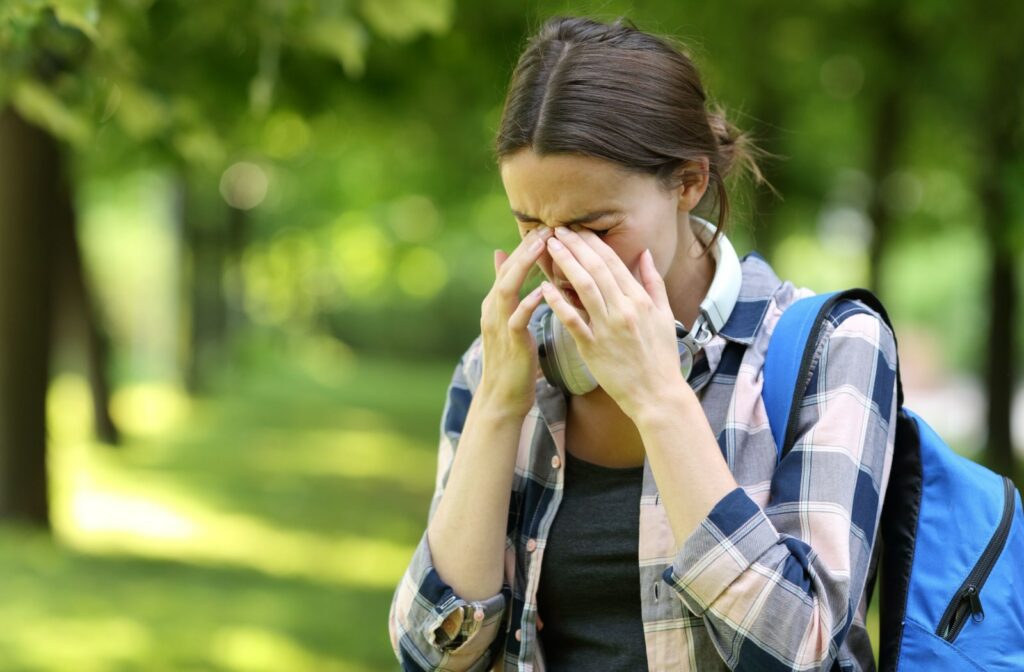Many individuals experience dry eyes. Dry eyes can result from several factors, such as dry eye disease, certain medications, and even allergies.
Allergies can cause eyes to feel dry and irritated. Dry eyes caused by allergens can include symptoms such as itchy eyes, sneezing, nasal congestion, and a runny nose.
Dry eye disease and dry eyes from allergens are 2 different conditions that require different treatments.
What Is Dry Eye Disease?
Dry eye is a common eye condition that affects around 5 million Americans. It affects the tear film, which keeps your eyes hydrated. The tear film consists of 3 layers. An issue with any one of these layers can negatively affect tear production, leading to dry eyes.
Various factors can impact the tear film, such as hormone changes, autoimmune diseases, inflamed eyelid glands, or allergies.
Dry eye occurs when your eyes don’t produce enough tears, or the quality of tear production is poor.
There are 2 different forms of dry eye disease:
- Evaporative dry eye: This is the most common form of dry eye, and it results when tears evaporate too quickly.
- Aqueous dry eye: This results when the tear film cannot produce enough liquid tears.
Evaporative dry eye occurs when the meibomian glands embedded in the eyelids no longer function properly. This impacts oil production, potentially leading to increased dryness and irritation. Meibomian glands produce oil that the tear film uses to keep eyes healthy.
Allergies can cause meibomian glands to become inflamed, which can lead to dry eyes.
How Do Allergies Cause Dry Eyes?
Allergens from environmental triggers like pollen, dust mites, pet dander, and smoke can cause eye inflammation and reduce tear production, potentially leading to dry eye symptoms.
Allergic conjunctivitis occurs when an allergen, such as pollen, dust mites, or pet dander, inflames the conjunctiva. Allergic reactions can cause the eyes to produce excess tears that evaporate quickly, leaving the eyes feeling dry and irritated. It’s not contagious and can be treated by removing or managing the environmental trigger.
Allergic conjunctivitis and dry eyes have overlapping symptoms. The main difference between dry eye and dry eyes caused by allergic conjunctivitis is that the allergens can make the eyes feel very itchy. The itchiness can often be intense and can cause the eye to become red, inflamed, and puffy because of frequent rubbing.
Redness and inflammation are common symptoms of dry eyes. However, if allergens aren’t a trigger for dry eye symptoms, the eyes typically feel dry and gritty, as if there’s a foreign object inside the eye.
Allergen-related (allergic conjunctiva) dry eyes often include sneezing, sniffling, or stuffy nose symptoms. Dry eye symptoms caused by allergens can include:
- Red, itchy, irritated eyes
- Puffy eyes
- Burning eyes
- Light sensitivity
- Watery eyes
- Discharge
Symptoms of allergic conjunctiva can worsen when allergens are in the air. This may be correlated with seasonal allergies like pollen.
Allergies usually run in the family. If you’re experiencing symptoms of allergic conjunctiva, such as itchy eyes, sniffling, and a stuffy nose, and are unsure of the cause, talk to your family doctor about conducting an allergy test.
Allergy tests can determine what substances can trigger your allergy symptoms.
Treatments for Dry Eyes Caused by Allergens
Treatment options for allergic conjunctivitis and dry eye disease are different. While both conditions can cause tear evaporation and clogged meibomian glands, your optometrist will determine the best treatment course.
Allergen-related dry eyes can be treated using:
- Artificial tears: These can be found over the counter. They help add moisture to the eyes. Consult your optometrist to determine which artificial tears will be most suitable for treating your allergies.
- Prescription eye drops: Your optometrist may prescribe a corticosteroid drop for moderate to severe dry eyes caused by allergens.
- Cold compress mask: Applying a cold compress to the eyes can help alleviate irritation, inflammation, and swelling from allergens.
Some allergens are difficult to entirely stay away from. To help reduce allergen-related dry eyes, reducing your exposure to allergens can help:
- Wash your hands regularly and avoid touching your eyes and face.
- Wear sunglasses outdoors to protect your eyes from light sensitivity.
- Use air purifiers to keep your windows closed at home to avoid environmental allergens.
- Keep your environment hydrated by using a humidifier. Dry eye symptoms can worsen in cold, dry environments.
- Allergen-related dry eyes include nasal congestion or runny nose symptoms, but a saline nasal stay can help clear your nose of allergens.
Antihistamines and decongestants, which are used to treat mild allergies, can worsen dry eye symptoms because they can lead to reduced tear production. Ask your optometrist whether continuing these medications is appropriate for your eye condition.
Schedule a Visit With Us!
Dry eyes and allergies can share many symptoms. To determine the best treatment for your symptoms, visit your optometrist for a diagnosis. Eye irritation from allergies may fade with time, but the discomfort isn’t worth holding off on your ocular needs.
If you’re experiencing symptoms of dry eyes, such as redness, irritation, and swelling, visit our team at Precision Eye Care to determine the cause and treatment.





